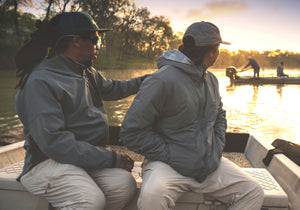Saltwater fly fishing, a captivating and sophisticated branch of the sport, offers a unique blend of challenge and reward. Unlike its freshwater counterpart, it involves venturing into diverse marine environments. This article, inspired by the expertise of Orvis, is designed to guide both newcomers and seasoned anglers through the nuances of saltwater fly fishing. Embracing the right strategies and tips can elevate your experience from just fishing to mastering the art of saltwater fly fishing.
Understanding the Basics: What is Saltwater Fly Fishing?
The Appeal of Saltwater Environments
Saltwater fly fishing is an art that takes anglers into the heart of diverse marine ecosystems. From the serene flats where bonefish tread to the deep blue where tarpon reign, this form of fishing offers an unparallelled connection with nature. It's not just about the catch; it's about the pursuit, the strategy, and the thrill that comes with facing the ocean's might.
Essential Gear for Saltwater Fly Fishing
To start, you’ll need a rod and reel that can withstand the harsh saltwater environment and powerful fish species. Saltwater rods are typically 8 to 10 feet long, with a stiffer backbone to cast larger flies and manage bigger fish. Reels should have a strong, smooth drag system and be resistant to corrosion. Flies vary based on the target species but are generally larger and made to mimic local bait fish or crustaceans.
Key Strategies for Successful Saltwater Fly Fishing
Understanding Your Target Species
Success in saltwater fly fishing hinges on understanding the behaviour and preferences of the target species. Each species has unique feeding habits, preferred habitats, and behavioural patterns. This knowledge is crucial in choosing the right equipment, flies, and techniques.
Mastering the Cast
In saltwater fly fishing, casting is more than just a means to an end; it's a critical skill. Mastery of both distance and accuracy is essential, especially when contending with factors like wind and wave action. Practise makes perfect, and perfect practise makes a successful saltwater fly fisher.
Reading the Water
An angler's ability to read the water - to understand the influence of tides, currents, and underwater structures - is paramount in saltwater fly fishing. This skill helps in locating fish, understanding their movements, and predicting their behaviour, greatly increasing the chances of a successful catch.
Tackling Different Environments
Fishing the Flats
Flats fishing is a stealth game. Here, you’re often sight fishing, which requires a keen eye and a patient approach. The thrill lies in spotting the fish, presenting the fly accurately, and watching the fish take it - a truly exhilarating experience.
Coastal and Offshore Fishing
Coastal and offshore environments present their own set of challenges and rewards. These waters are home to some of the most sought-after game fish. Adapting to these environments involves dealing with stronger currents, deeper waters, and often bigger fish, requiring robust gear and advanced techniques.
Advanced Techniques and Tips
Fly Selection
Selecting the right fly is both an art and a science. Factors like local prey species, water clarity, depth, and light conditions play a crucial role. The ability to adapt your fly selection based on these factors can significantly improve your success rate.
Utilising Modern Technology
In today's world, technology can be a game-changer in saltwater fly fishing. GPS systems, fish finders, and even mobile apps can provide valuable information about fish patterns, weather conditions, and ideal fishing spots.
Conservation and Sustainable Practises
The ethos of conservation is deeply embedded in the sport of fly fishing. Practising catch and release, using barbless hooks, and being mindful of local ecosystems are all part of being a responsible angler. Our shared passion for fishing should be balanced with a commitment to preserving these precious environments for future generations.
FAQs
Q: What are the most important factors in successful saltwater fly fishing?
A: Key factors include understanding the behaviour and habitat of the target species, mastering casting techniques, reading the water, and choosing the right flies. Adaptability and knowledge of the marine environment also play a crucial role.
Q: How does saltwater fly fishing differ from freshwater fly fishing?
A: Saltwater fly fishing often involves targeting larger fish, dealing with more challenging environmental conditions (like saltwater corrosion and stronger currents), and requires heavier gear and more robust techniques. The variety of species and environments also tends to be broader in saltwater fishing.

